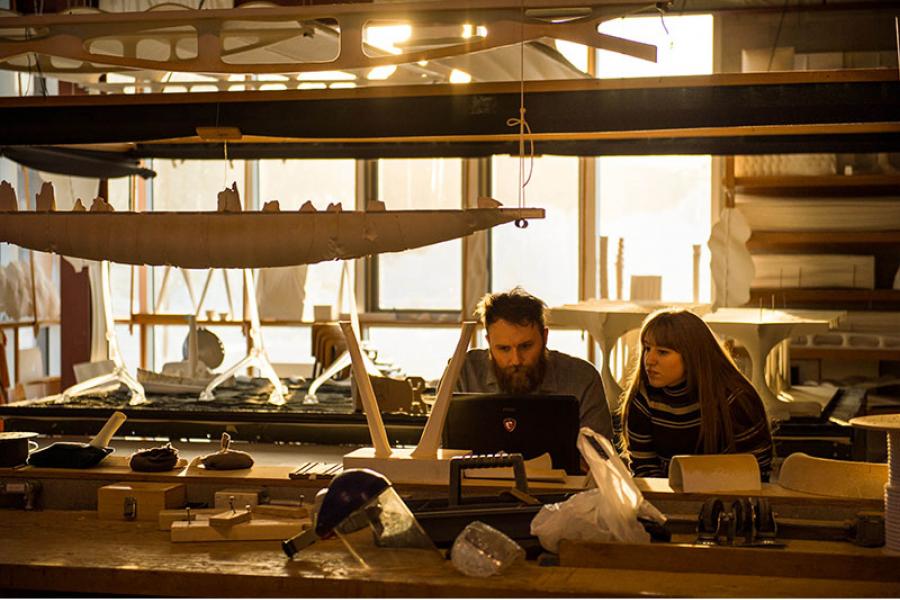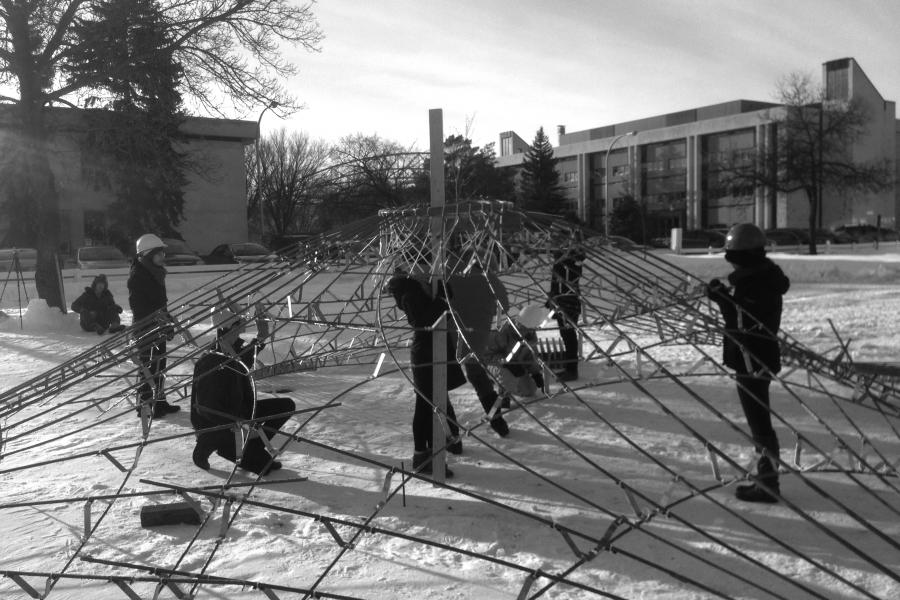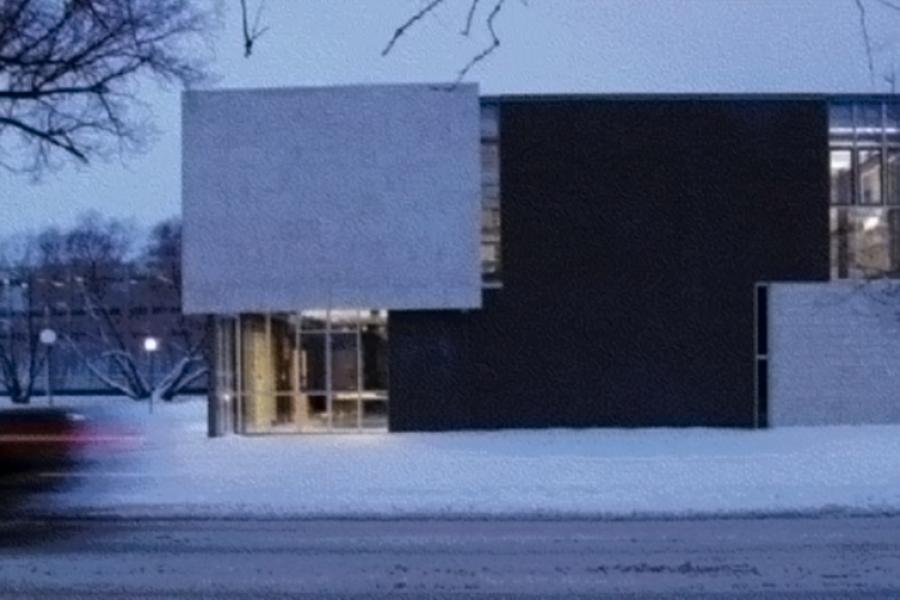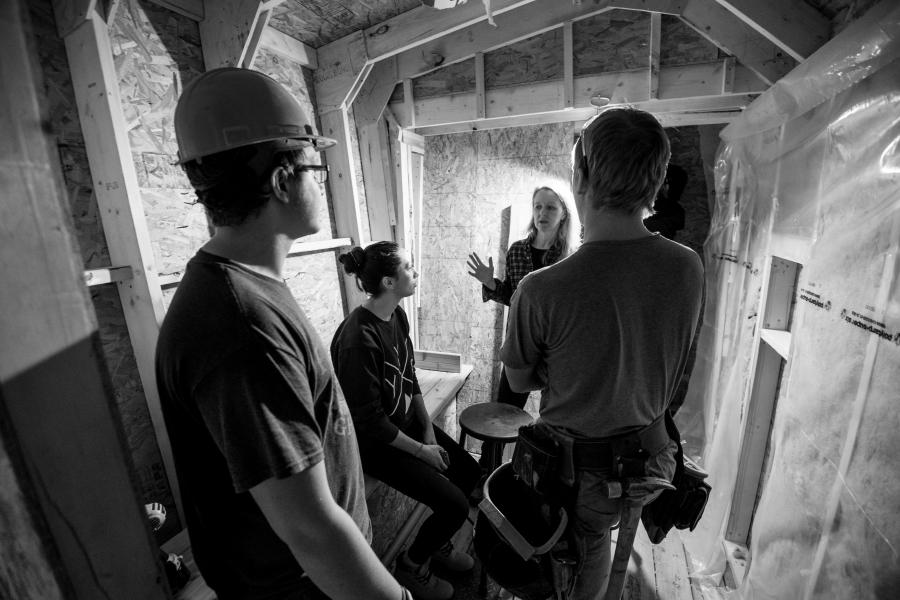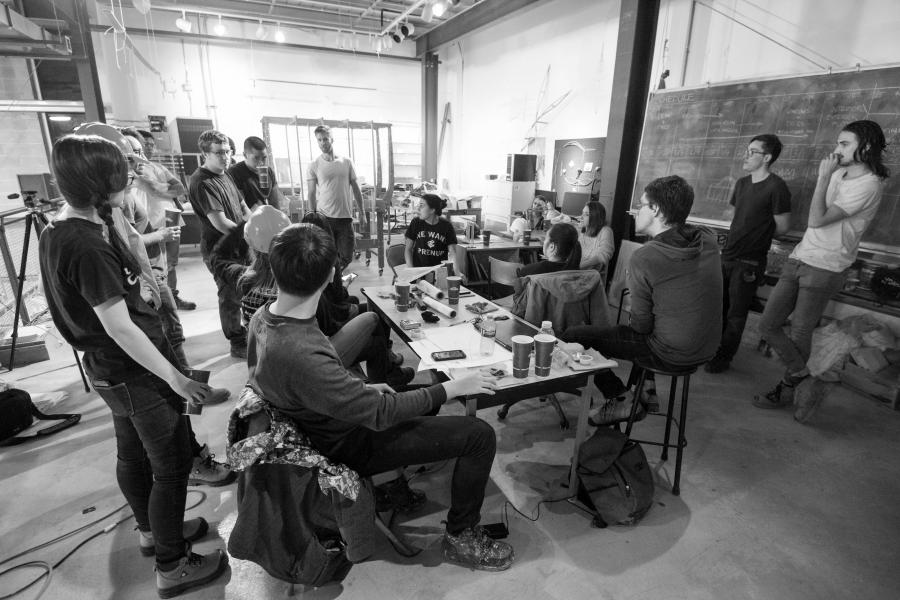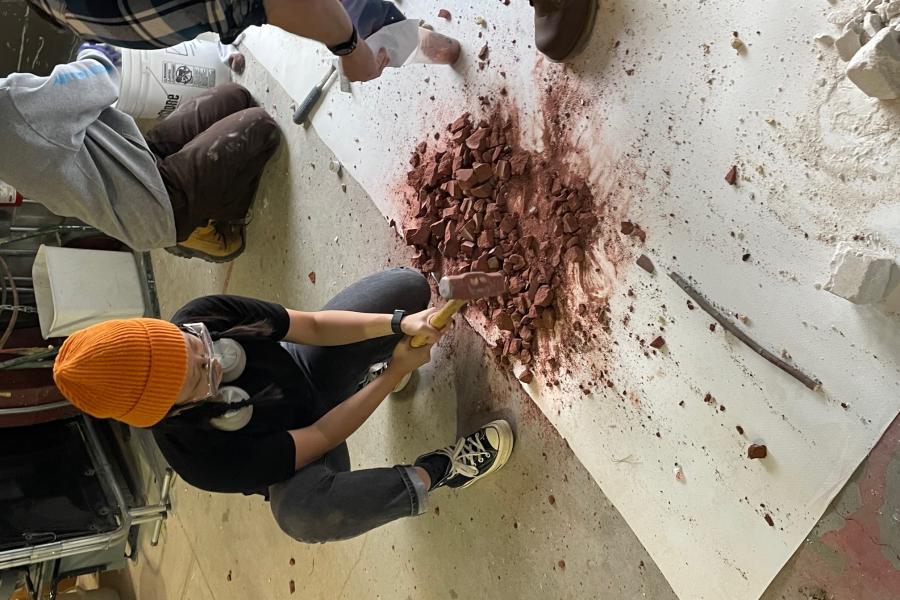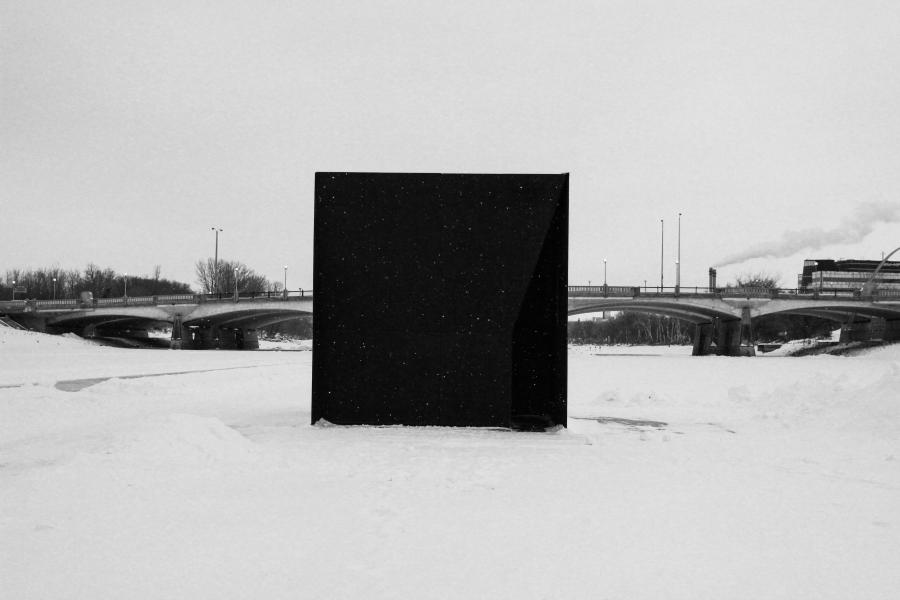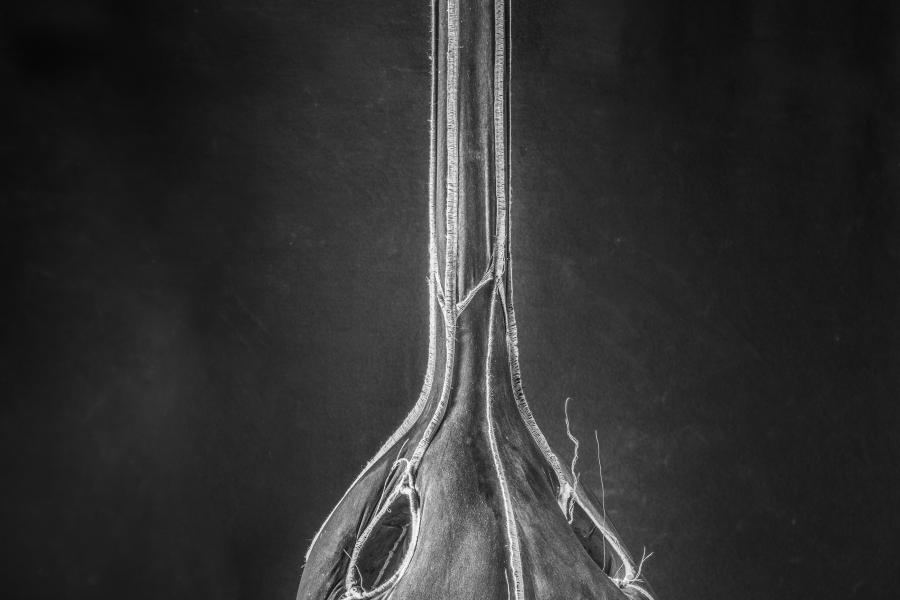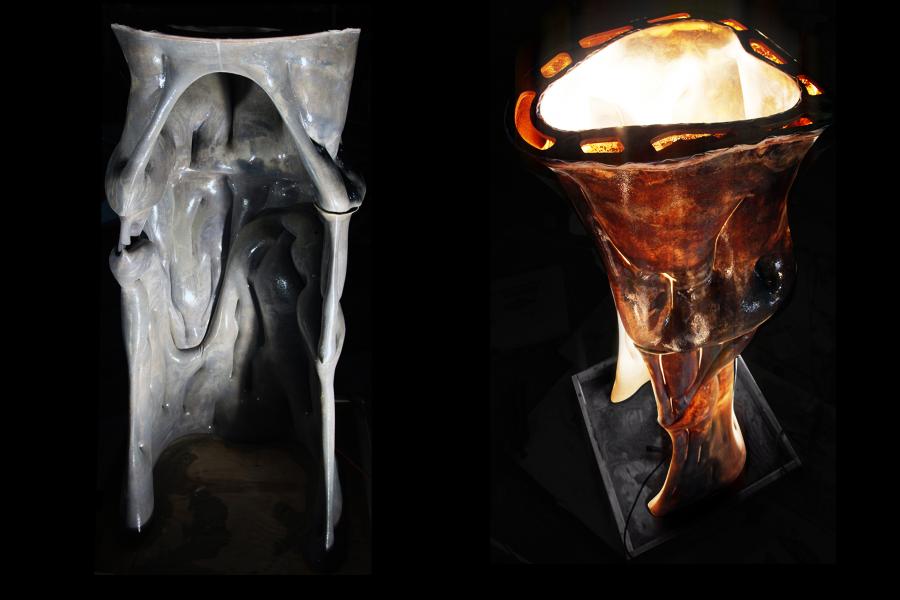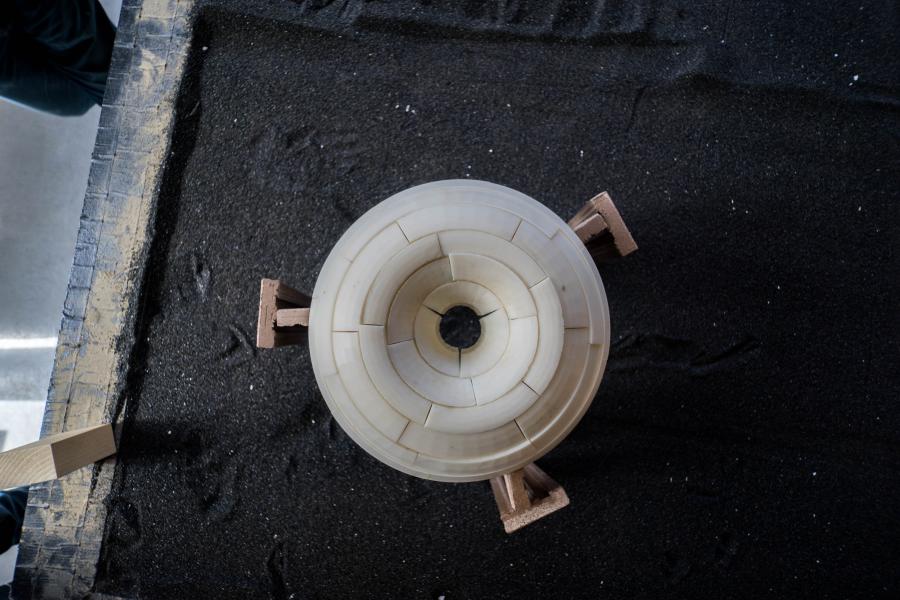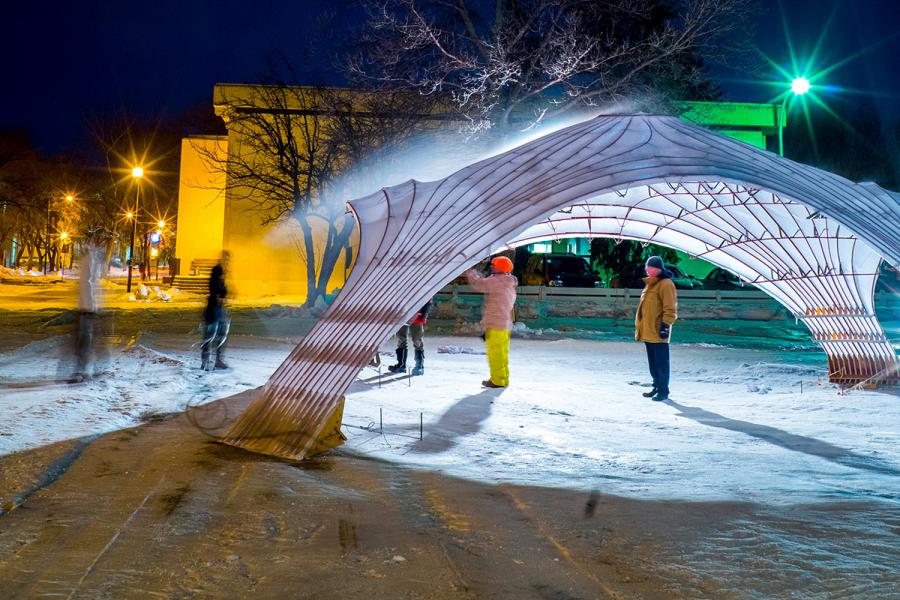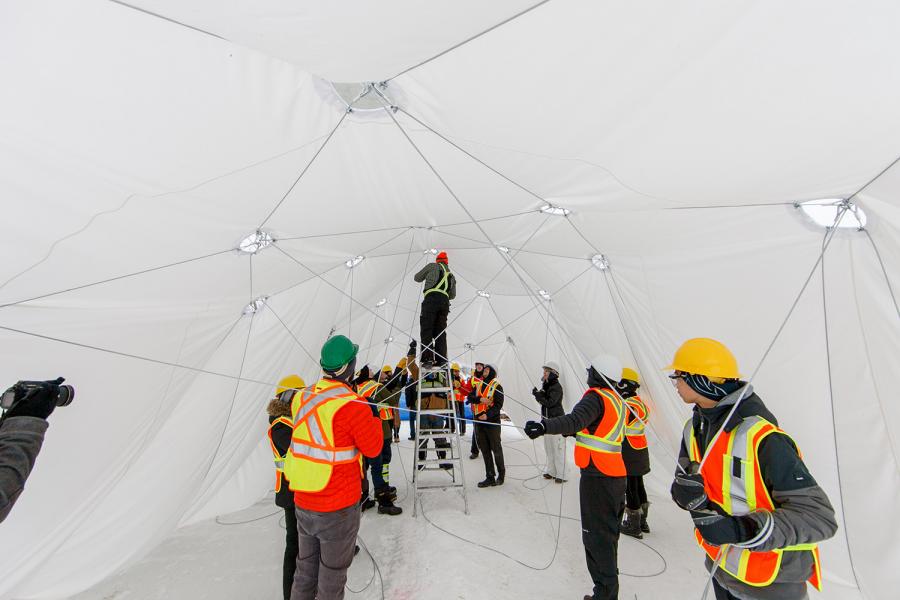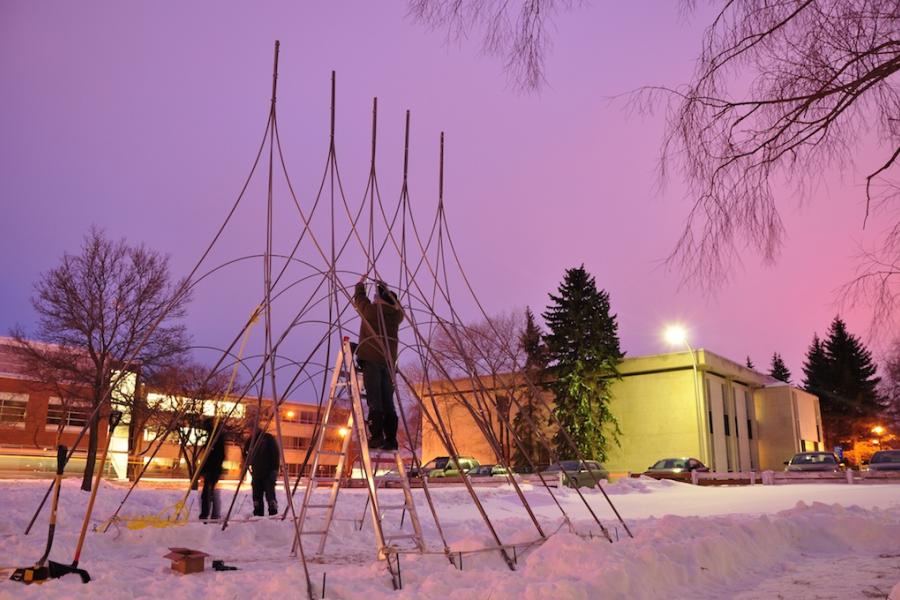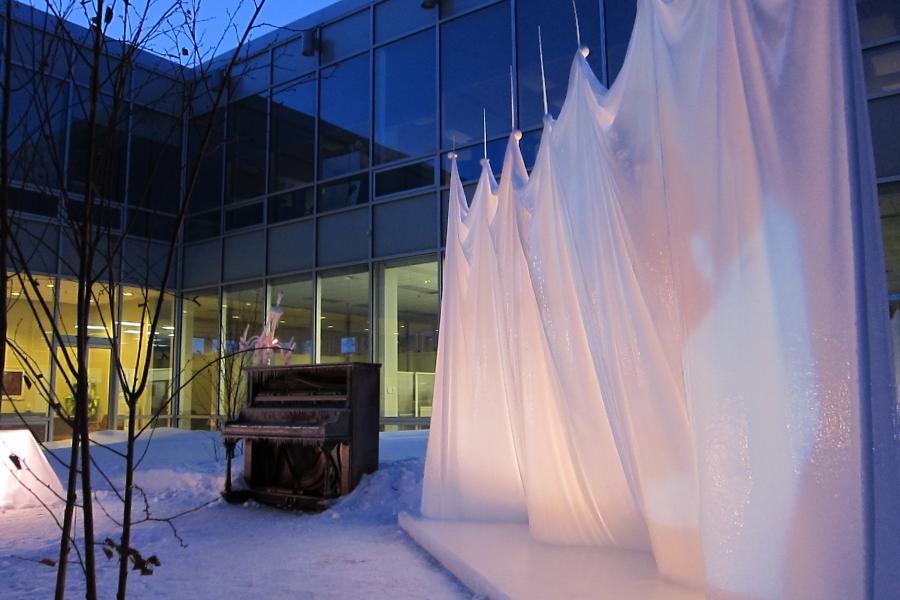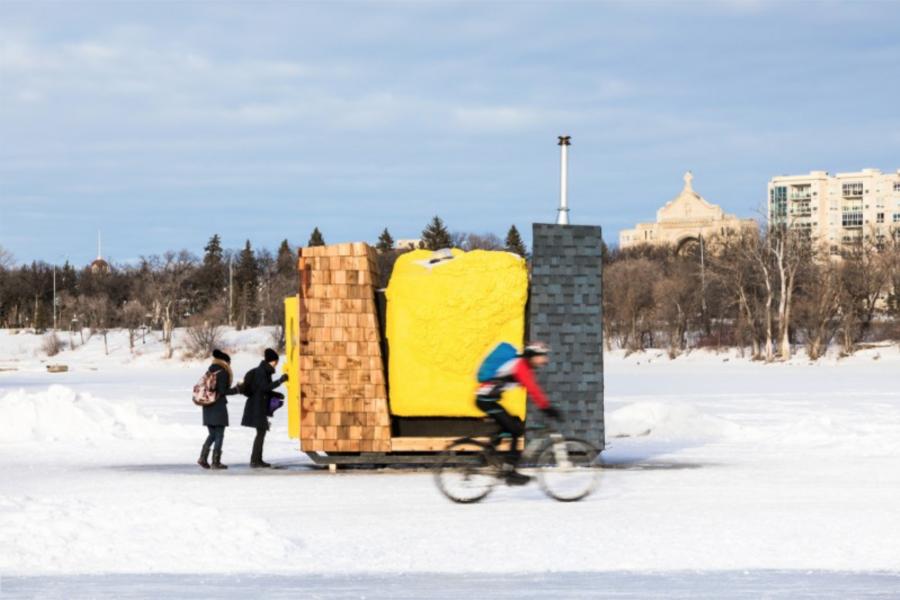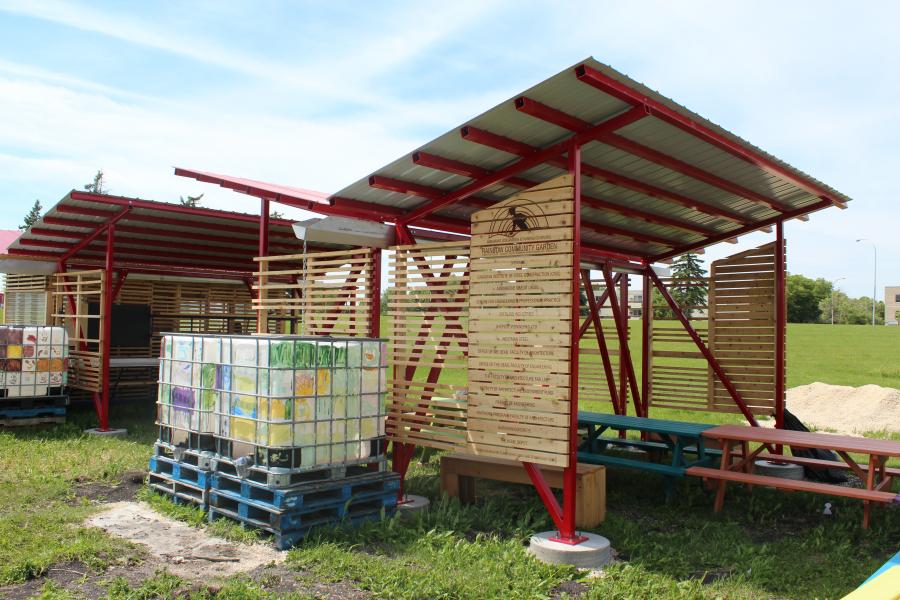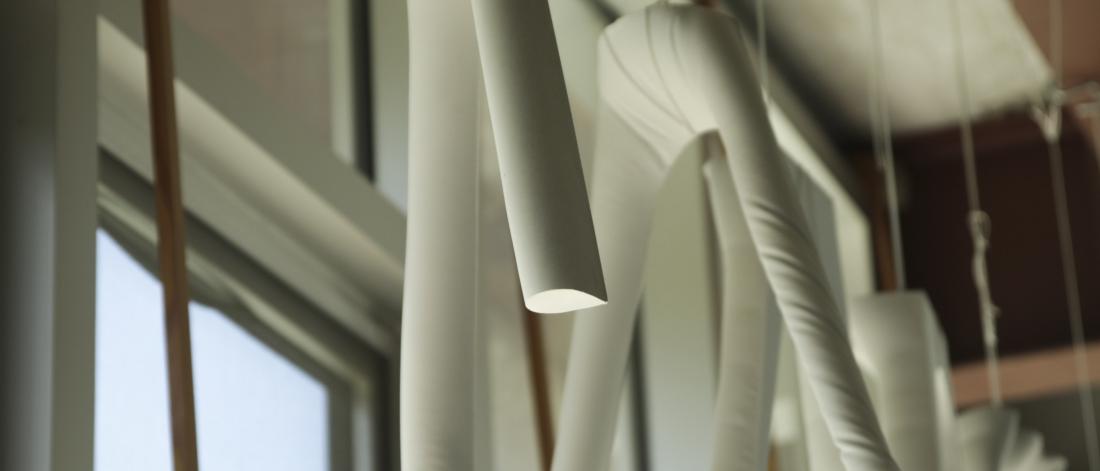
About CAST
The Centre for Architectural Structures and Technology (CAST) is an interdisciplinary research laboratory embracing technical and poetic dimensions of making. CAST provides unique conditions for critical and creative experimentation with technologies germane to the design, construction and performance of the built environment. The generous and well-equipped CAST facility enables research at diverse scales and with a variety of media, methods and tools. Researchers at CAST explore materials and assemblies; experiment with building techniques; devise and test prototypes; study the limits and potential of natural laws; investigate sustainable practices and environmental stewardship; cultivate Indigenous modes of making; and collaborate in the rigorous play of imagination. CAST supports both discipline-specific and cross-disciplinary research that advances knowledge, promotes creativity, and supports innovation in teaching. CAST seeks to promote research benefiting students, researchers, industry, the public and our planet.
The CAST laboratory is unique in Canada, having been specifically designed to support a vision of architectural education and research grounded in shared acts of making. CAST also participates in an expanding constellation of world-class research facilities within and beyond the University of Manitoba.
CAST offers a 500m2 (5,500ft2) facility well equipped for work in any standard—and many non-standard—fabrication materials and methods, including welding, concrete, masonry, carpentry, and earthworks. The building is centrally located on the University of Manitoba’s Fort Garry campus. It is situated between the Faculties of Architecture and Engineering, and is close to the sculpture and ceramic studios of the School of Fine Arts.
The CAST Building was designed and constructed with nearly $1.5 million in support from the following: the Canada Foundation for Innovation; the Manitoba Innovations Fund; Western Economic Diversification Canada; and over one hundred companies.
Research
The Centre for Architectural Structures and Technology (CAST) does not offer a specific program of study. CAST is a resource of the University of Manitoba’s Faculty of Architecture, and most students working at CAST are enrolled in one of the Departments within the Faculty. A few students doing work with us have been enrolled in the University of Manitoba’s Price Faculty of Engineering, while others have worked here as visitors from other universities. Work and study at CAST is done either through workshop classes offered by the Faculty of Architecture, research thesis projects in the Department of Architecture, or by special research teams engaged in specific projects. Funding is sometimes available for graduate research assistants enrolled in the University of Manitoba’s Department of Architecture. Occasionally, when the opportunity arises, the Laboratory will host a CAST Visiting Researcher as well.
Research in Residence Program
The Research in Residence Program at CAST is awarded to individuals coming to the Faculty of Architecture to pursue their own independent focused research. Appointments are made for a minimum of one semester to a maximum of one year.
The main focus of the Researcher in Residence program is to facilitate and promote new explorations in materials and assemblies; experiments with building techniques; devise and test prototypes; study the limits and potential of natural laws; investigate sustainable practices; cultivate Indigenous modes of making; and collaborate in the rigorous play of imagination. CAST supports both discipline-specific and cross-disciplinary research that advances knowledge, promotes creativity, and supports innovation in teaching. CAST seeks to promote research benefiting students, researchers, industry, the public and our planet.
CAST supports both discipline-specific and cross-disciplinary research that advances knowledge, promotes creativity, and support innovation in teaching. CAST seeks to promote research benefiting students, researchers, industry, the public and our planet.
Open call for industry-sponsored researcher-in-residence program
OPEN CALL FOR PROPOSALS FOR THE CAST INDUSTRY-SPONSORED RESEARCHER-IN-RESIDENCE PROGRAM
FALL 2025 or WINTER 2026
Academic and industry researchers from around the world are invited to submit proposals to participate in the upcoming Research in Residence program at The Centre for Architectural Structures and Technology (CAST) in the Faculty of Architecture at the University of Manitoba.
The specific appointment invites researchers, practitioners, and industry professionals whose interests align (directly or tangentially) with areas of innovative masonry construction techniques and technologies. Strong preference will be given to candidates whose research proposals clearly define how their work responds to our ever-present and urgent environmental crisis.
The position is a 4-month appointment* in the Faculty of Architecture, beginning in either September 2025 and extending to the end of December (FALL) or in January 2026 and extending to the end of April. (Winter)
The appointment allows for the Researcher in Residence to offer public lectures, and participatory workshops (open to all students and faculty alike) and have full access to the facilities and workspaces at CAST, our FabLab, woodworking and metalworking shops.
The candidate would also have the opportunity to showcase their work at Faculty’s Exhibitions and publications.
Exposing their research work to many local industry professionals, faculties and the general public.
* Duration of appointment may vary depending on the background, affiliation and circumstances of the applicant.
FUNDING
While it is expected that applicants come with financial support of their own, it should be noted that this appointment will be generously funded by The Manitoba Masonry Institute (MMI) and a stipend of $8,500.00 will be offered to successful applicants.
Successful candidates may also benefit from short-term teaching appointments in the faculty based on the circumstances at the time. This may be negotiated upon offer.
SUBMISSIONS
Expression of Interests and/or proposals can be sent to the CAST coordinator at liane.veness@umantoba.ca. Please contact the CAST coordinator at least 6 months prior the preferred start of the appointment to allow adequate time for coordination of travel visas (if required) and potential funding opportunities.
PROPOSAL REQUIREMENTS
All applicants must submit.
A resume or curriculum vitae
A research statement and proposal outlining the applicant’s research expertise and proposed research project to be carried out at CAST – May include images. (Maximum 5 pages)
Brief description of (proposed) workshop
SELECTION PROCESS
Candidates will be reviewed and shortlisted by the CAST Committee. Once selected applicants will be contacted and notified of the committee's decision.
Non-Canadian residents may be required to obtain a visa. Once accepted as the Research in Residence, visa information will be provided.
Open call for proposals
CALL for our CAST RESEARCHER IN RESIDENCE PROGRAM NOW OPEN!
Fall 2025 – Winter 2026
Academic and industry researchers from around the world are invited to submit proposals to our Research in Residence program at The Centre for Architectural Structures and Technology (CAST) in the Faculty of Architecture at the University of Manitoba. The appointment invites researchers to apply whose interests explore materials and assemblies; experiment with building techniques and construction methods; study the limits and potential of natural laws; investigate sustainable practices; cultivate Indigenous modes of making; and collaborate in the rigorous play of imagination. Strong preference will be given to candidates whose research proposals clearly define how their work responds to our ever-present and urgent environmental crisis.
This flexible research position can extend anywhere between 2 weeks to a 4-month appointment* in the Faculty of Architecture, taking place in either the fall semester (September– December 2025) or the Winter semester (January-April 2026)
* Duration of appointment may vary depending on the background, affiliation and circumstances of the applicant.
The appointment allows for the Researcher in Residence to offer public lectures, participatory workshops (open to all students and faculty alike), and have full access to the facilities and work spaces at CAST, our FabLab, woodworking and metalworking shops.
The candidate would also have the opportunity to showcase their work at Faculty’s Exhibitions and publications, exposing their research work to many local industry professionals, faculties and the general public.
Past participants of the CAST researcher in residence program have explored fabric formed pre-casting, spatial modules made with geopolymer concrete, fabric formwork filled with bio-materials and non-funicular masonry structures.
FUNDING
While it is expected that applicants come with financial support of their own, CAST awards up to $11,000.00 which can be used to cover transportation costs, living expenses, and material costs.
Successful candidates may also benefit from short-term teaching appointments in the faculty based on the circumstances at the time. This may be negotiated upon offer.
SUBMISSIONS
Proposals must be electronically submitted in PDF format to the CAST coordinator at Liane.Veness@umanitoba.ca no later than midnight on June 30th
PROPOSAL REQUIREMENTS
All applicants must submit.
- A resume or curriculum vitae
- A research statement and proposal outlining the applicant’s research expertise and proposed research project to be carried out at CAST – May include images. (Maximum 5 pages)
- Brief description of (proposed) workshop
SELECTION PROCESS
Candidates will be reviewed and shortlisted by the CAST Committee. Once selected applicants will be contacted and notified of the committee decision. Non-Canadian residents may be required to obtain a visa. Once accepted as the Research in Residence, visa information will be provided.
Research projects
Facilities
CAST supports both long-term (4 months) and short term (2 weeks or less) research and teaching endeavours. All research and teaching activities must be organized by the CAST coordinator prior to commencement of work. Please send inquiries to CAST coordinator, Liane Veness.
The CAST Building has been specifically designed to support full-scale speculative experiments on new design possibilities using a wide range of materials and building technologies. In particular, CAST encourages collaborative, project-based experiments and projects involving architects, engineers, and industry. The design of the building also supports the teaching of building technology through its structural, mechanical, and electrical systems, which are all left exposed as a three-dimensional “textbook”. A wide range of tools and equipment allows small-scale physical models to be constructed as full-scale proof-of-concept prototypes in our laboratory space. Our association with industry allows us to develop and test new construction and design ideas in industrial settings.
The CAST Building itself provides architecture and engineering students with other venues for full-scale design and construction experiments. For example, the CAST Building’s masonry cavity walls are built with ten special openings, specifically designed to receive experimental infill designs. Here students can affect the architectural design of the building itself, while studying important building envelop detailing and design issues.
Equipment
Structural testing
45 m2 (490 ft2) strong floor, with 50 Mpa (110,000 lb.) MTS hydraulic actuator. This equipment is used in conducting structural tests of students’ designs. It is supplemented by the nearby Department of Civil Engineering WR McQuade Structures Lab.
Fabrication shops
- Floor tools and hand tools for fabricating prototypes and models include:
- Metal Cutting and soldering;
- Textile cutting and sewing equipment;
- Concrete mixing and placement equipment;
- Air-drive and electric wood working tools at CAST are further supplemented by the Faculty of Architecture’s Workshop facilities next door in the John A. Russell Building.
- CNC router
- Laser cutters
- 3D printing and scanning,
- Vacuum former
- Six workstations dedicated to digital modelling software
Studio space
- 800 ft2 mezzanine level for collaborative and individual design work.
Computing
The CAST Building is equipped with dedicated computers for graphics and structural engineering, and a fiber optic connection to the Faculty of Architecture and University of Manitoba computer networks.
Sound system
CAST has its own sound system – music is the universal solvent.
Construction of CAST
The CAST Building is the first building constructed for the University of Manitoba’s Faculty of Architecture since 1959. It marks a new beginning in architectural education and research. There is no other architectural laboratory quite like it.
The project began in 1989 with a grant from the Canada Foundation for Innovation (CFI) in support of Prof. Mark West’s research with flexible fabric formworks for concrete structures. This grant provided a total of $350,000 (CN) to buy tools and equipment, and to construct a modest prefabricated metal building. The construction budget in this original grant consisted of $70,000 (CN) in in-kind donations from Winnipeg area construction companies, and $87,000 (CN) in cash. The CAST Laboratory as it stands today is now worth nearly $1.5 million (CN).
The realization of CAST is the result of three primary forces:
First, was the desire on the part of the Faculty of Architecture and the Director of CAST to transform this erstwhile fabric formwork laboratory into a more inclusive and ambitious architectural research laboratory. The vision for a new kind of architectural education called for a facility that could support and sustain that vision.
Second, the Faculty of Architecture made a commitment to construct something more than a utilitarian structure; it was strongly felt that the building should be a work of architecture.
Third, the CAST Building project received extraordinary support from the Canadian construction industry and from Provincial and Federal levels of government. Early support from a small number of companies and industry associations including the Canadian Masonry Research Institute, The Canadian Sheet Steel Building Institute, Mr. Maurice Steele, MD Steele Construction, and other local contractors and suppliers, allowed us to launch an ambitious program of construction, simultaneously accompanied by fundraising efforts to meet the financial demands of the project. Eventually over 100 companies, industry associations, government agencies, and individuals contributed to this project.
Contributors
The following organizations, companies, and individuals contributed their time, money, and expertise to the design and construction of the CAST Laboratory Building. Their support has made this project possible.
Government
Canada Foundation for Innovation
Western Economic Diversification Canada
Manitoba Innovation Fund
Industry Associations
American Concrete Institute
Canadian Institute of Steel Construction
Canadian PreC.A.S.T/Prestressed Concrete Institute-Manitoba Chapter
Canadian Sheet Steel Building Institute
International Union of Bricklayers & Allied Craftsworkers (Manitoba Local #1)
Manitoba Masonry Contractor’s Association Inc.
Manitoba Ready-Mix Concrete Association
National Air Barrier Association
The Canadian Masonry Research Institute
Design Team
Herbert Enns, Architect
GBR Architects Limited
Crosier Kilgour & Partners Ltd.
SMS Engineering Ltd.
MCW/AGE Consulting Professional Engineers
UMA Engineering Ltd.
Private Donors
Acres Manitoba Limited
A & R Concrete Pumping Ltd.
A M Masonry Ltd.
Alf Blerot Masonry Ltd.
Allmar Distributors Ltd.
Alpha Masonry Ltd.
Alumicor Ltd.
B & F Masonry (1992) Ltd.
Battlefield Equipment Rentals
Behlen Industries
Bird Construction Co.
Mr. Patrick Randal Black
Bockstael Construction (1979) Ltd.
Brock White Canada
Building Products & Concrete Supply Ltd.
Building Professional Consortium
C arlson Decorating and Sandblasting Company Ltd.
CCI Industries Ltd.-Tallcrete
CCI Tallcrete
Cindercrete Products Ltd.
Clima Seal
CML Northern Blower Inc.
Comstock Canada Ltd.
Con-Force Structures Ltd.
Copper Sales Inc.
Corus Metal Profiles: Division of Corus CIC Inc.
Cowin Steel Co. Ltd.
Cox Constuction
Dofasco Inc.
Dominion Construction Company Inc.
Dow Building Materials
Durwest Construction Systems
Dustrial Plastics & Steel Ltd.
E H Price Ltd.
E K Construction 2000 Ltd.
Euro-Can Enterprises Ltd.
Eutectic Canada Inc.
Falcon Machinery (1965) Ltd.
Favorite Transport Ltd.
FWS Construction Ltd.
G D Johnson Construction Materials
Gebhardt Masonry Ltd.
Gillis Quarries Ltd.
Greensteel Industries Ltd.
Inland Aggregates Ltd.
I-XL Brick Supplies Ltd.
I-XL Industries Ltd.
Kraft Construction Company Ltd.
Kurt Bauer Contractors Ltd.
LaFarge Canada Inc.-Cement Division
LaFarge Canada Inc.-Construction Materials Division
Lluma Sales & Rentals Ltd.
M D Steele Construction Ltd.
M G I Canada Inc.
M R B Masonry Ltd.
Man-Shield Construction Inc.
Maple Leaf Construction Ltd.
McCaine Electric Ltd.
P C L Constructors Canada Inc.
P M L Reinforcing Ltd.
P P G Industries Inc.
Plasti-Fab Division of PFP Corporation
Quality Glass Installations
Reimer Soils
Retro-Specs Consultants Ltd.
RHI Canada Ltd.
Robertson Building Systems
Roma Masonry Ltd.
Scott Screen and Wire Co. Ltd.
Shopost Iron Works (1989) Ltd.
Soprema Canada
Specialty Construction Products Ltd.
Star Building Materials
Steel-Craft Door Products Ltd.
Mid-Canada Reinforcing Inc.
Mr. Maurice D. Steele
Steelway Building Systems
Stelco Inc.
Subterranean (Manitoba) Ltd.
Supra Steel Construction Services Ltd.
Tatra Ornamental Iron Works Ltd.
The Bilco Company
The National Testing Laboratories Limited
Tri-Star Masonry Contractors Ltd.
Tri-Tec Drywall Services Ltd.
United Rentals
York International Corporation, Sales & Service
Contact Us
Centre for Architectural Structures and Technology (CAST)
91 Dafoe Road
Faculty of Architecture
University of Manitoba
(Fort Garry Campus)
Winnipeg, MB R3T 2M6

